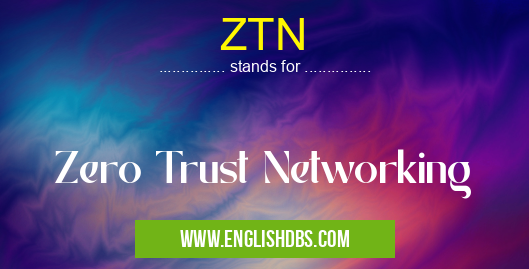What does ZTN mean in NETWORKING
Zero Trust Networking (ZTN) is a cybersecurity concept that requires organizations to look at every single entity connected to their networks as a potential threat. It goes beyond traditional firewalls and other perimeter-based security solutions by requiring users and devices to authenticate before being allowed access, regardless of where they are located. ZTN is based on the principle of “never trust, always verifyâ€. By monitoring all traffic before it reaches its destination, organizations can ensure that only verified and authorized users, applications, and devices have access to their resources.

ZTN meaning in Networking in Computing
ZTN mostly used in an acronym Networking in Category Computing that means Zero Trust Networking
Shorthand: ZTN,
Full Form: Zero Trust Networking
For more information of "Zero Trust Networking", see the section below.
» Computing » Networking
Essential Questions and Answers on Zero Trust Networking in "COMPUTING»NETWORKING"
What is Zero Trust Networking?
Zero Trust Networking is an approach to IT security that focuses on verifying user identities and access privileges before granting network access. This type of architecture helps to protect networks from malicious activity, data breaches, and other cyber threats by never trusting users or devices until they have been authenticated and authorized.
How does Zero Trust Networking differ from traditional network security models?
Unlike traditional network security models that rely on the concept of an "internal trusted network," Zero Trust Networking assumes that no device or user is inherently trusted and instead validates all attempted access requests against a set of predetermined criteria before granting access. This helps to ensure that sensitive company data remains secure regardless of whether the user or device is considered internal or external.
What advantages does Zero Trust Networking provide?
By aligning with the principle of least privilege, Zero Trust Networking helps organizations reduce their attack surface and protect sensitive data by only giving users access to the resources they absolutely need. Additionally, this type of architecture makes it easier to audit user activity due to its enforcement of strong authentication policies, helping organizations better detect malicious behavior or data leakage attempts.
What protocols are used in a Zero Trust Network implementation?
Common protocols used in a Zero Trust Network implementation include Multi-Factor Authentication (MFA), Role-Based Access Control (RBAC), and Identity and Access Management (IAM). These protocols help to ensure that user identities are confirmed before granting them access to the network, thereby reducing the risk of unauthorized intrusions or other potential cyber threats.
Why is identity assurance critical for effective Zero Trust Networking?
Identity assurance is essential for effective Zero trust networking because it provides an increased level of confidence in knowing who has tried to gain access to a system, as well as which applications they can be allowed to use if authenticated successfully. This helps organizations restrict unauthorized users while ensuring authorized users are given proper network permissions so they can do their jobs efficiently without running into unnecessary roadblocks.
What challenges exist when implementing a Zero Trust Network?
The key challenge when implementing a zero trust network lies with managing authentication information correctly; in order for it to be effective, organizations must make sure all devices adhere to appropriate authentication processes such as using MFA or other methods for verifying identity credentials. Additionally, organizations must ensure that all users are adequately trained on how this new protocol works so there are no gaps in policy enforcement which could potentially lead to insecure practices or threats being overlooked.
How can monitoring help maintain a secure environment with a Zero Trust Network?
Monitoring plays an important role when maintaining a secure environment with a zero trust network because it provides visibility into any anomalies within your existing systems which may indicate malicious activity taking place; this includes monitoring changes in user behavior patterns or suspicious traffic coming through your networks that may be indicative of potential threats lurking underneath. Additionally, monitoring can also help identify potential weaknesses within your systems so those areas can be addressed promptly before any damage takes place.
What information should be monitored when utilizing a zero trust model?
When utilizing a zero trust model, it's important to monitor both system logs as well as application logs; these contain key insights into how different users interact with your environment as well as where malicious actors might try gaining entry points into your system via unintended vulnerabilities such as unpatched software programs or weak passwords used by legitimate personnel. Additionally, it's also beneficial to monitor changes made at the policy level so you remain aware of what types of activities should not be permitted within your organization's infrastructure.
Final Words:
In conclusion, Zero Trust Networking provides companies with an extra layer of protection when it comes to online security threats by continuously verifying user identities in order for them to gain entry into corporate networks while simultaneously blocking out malicious actors attempting infiltration through various techniques. Although implementing ZTN will add extra costs — it offers an effective solution for improving both compliance standards as well as cost efficiency in keeping digital assets safe from harm in today's ever-evolving cybersecurity landscape.
